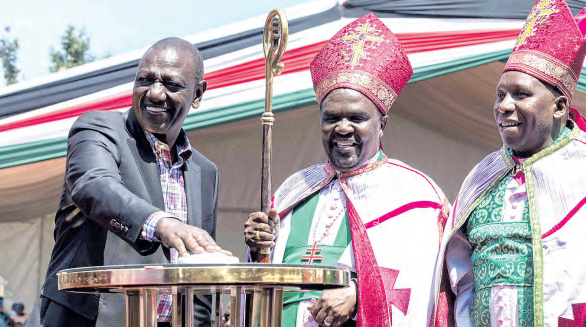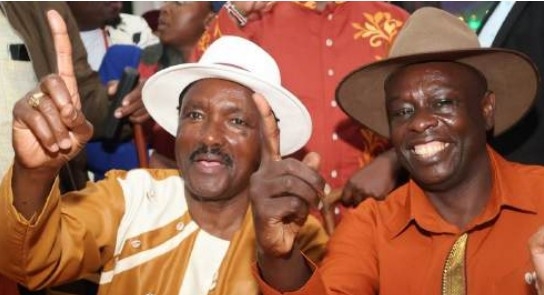.jpg&w=3840&q=100)

ARTICLE BY CALEB MWAMISI
Kenya’s current political climate has seen Christian leaders both supporting and critiquing the administration, prompting mixed reactions within Pentecostal and broader Christian circles.
Recent concerns about the genuineness of statements claiming government failure raise questions about accountability and responsibility in public discourse.
While critique from religious circles can be constructive, it is essential to balance it with consistent, positive engagement—a role that Christian leaders are called to fulfill according to Scripture.
As James 1:22 instructs, “But be doers of the word, and not hearers only, deceiving yourselves.” Furthermore, 1 Thessalonians 5:11 encourages believers to “encourage one another and build each other up,” underscoring the need for a proactive, supportive approach in guiding the nation toward a better future.
Reckless remarks can sow discord and diminish the Church’s credibility as a moral authority, eroding trust in spiritual leadership. Such statements, when made carelessly, can alienate the faithful and cast doubt on the integrity of religious institutions.
The President has been a committed Christian, with his identity and values being intrinsic to his leadership. Upon taking office, he opened doors for faith leaders, inviting them to sanctify State House through fervent prayer and raising an altar within its precincts.
Such integration platforms should inspire Christian leaders to support and guide the government constructively, akin to how Aaron and Hur held Moses’ hands up during battle (Exodus 17:12).
In this context, it is vital to commend those who have faithfully prayed for the government, fostering unity and spiritual strength amidst challenges.
Additionally, Christian leaders are called to engage with the government not just during crises but consistently.
Their voices should contribute to policy discussions, advocate for the marginalised and provide counsel that aligns with Christian values.
Constructive dialogue between the Church and government can enhance mutual understanding and cooperation, enabling both to address national challenges more effectively.
The President’s humility toward Pentecostals is evident through his participation in various spiritual gatherings, including significant events led by internationally renowned figures like Benny Hinn, who prayed for Kenya’s peace and stability.
This demonstrates a leadership style that values spiritual counsel and encourages the faithful to align with godly leaders.
However, leaders must also be cautious of reckless rhetoric that undermines their credibility and the overall mission of the Church Christian leaders in Kenya must reflect on whether they have actively supported the President’s vision or merely observed passively until issues arise.
Scripture promotes fostering wisdom and resilience within the nation, as Proverbs 11:14 advises that “where there is no guidance, a people fall”.
A truly faith-driven approach transcends critique; it involves steadfast support through prayer, intercession and constructive feedback, ensuring the Church remains a positive force shaping the country’s trajectory toward unity and purpose.
Has the Church actively engaged in supporting its leaders, or has it stepped back, emerging only during crises? Have Kenya’s Christian communities embraced their mandate to shape the nation through consistent prayer and constructive engagement?
Leaders must demonstrate accountability and commitment, engaging with governance in ways that promote stability, justice and compassion.
When Kenya’s Pentecostals gathered for the President’s inauguration, they imparted blessings and guidance, signaling their commitment to his administration.
These moments refl ect a history where faith reinforces governance, weaving a fabric of moral support that transcends political divides. Yet sporadic support risks diminishing the Church’s role as a moral compass for government and society.
As Romans 13:1 reminds us, all authority exists under God’s ordination and the Church’s constructive engagement with leadership is part of this divinely ordained structure. Is it suffi cient to critique after the fact? Or should the Church, grounded in the ethics it champions, commit itself to guiding and supporting governance consistently and humbly?
The President’s open expression of faith invites all Christians to actively uphold a government rooted in values, transparency and justice.
When leaders critique, it is expected that their approach balances guidance with love and hope for national unity and progress, especially when the President shares their faith.
Reckless talk that lacks compassion and foresight can lead to disillusionment among believers and weaken the Church’s ability to be a transformative force in society.
Genuine love, defined by commitment and sacrifice in Romans 13:10 and demonstrated through patience and kindness in 1 Corinthians 13:4-7, is essential in reflecting on the role of Christians in governance.
Leaders require unwavering support to achieve a shared vision for national integrity and resilience.
The Church must act as an anchor of unity, taking on the responsibilities of authenticity and meticulousness in this vital relationship.
Biblical David faced numerous challenges, including the harrowing experience of the Amalekites kidnapping his wives and children, where his own people sought his life, blaming him for their plight.
The prophet of God encouraged him, inspiring David to rally his men to pursue their captors and reclaim what was lost.
Despite these trials, he emerged victorious, demonstrating unwavering faith in the Lord. This incident, detailed in 1 Samuel 30, highlights his resilience and leadership qualities.
Similarly, the President has faced signifi cant adversities during his administration, including chaos during protests and public discontent.
Yet, like David, he shows a commitment to faith and leadership, navigating through storms. His efforts to invite Christian leaders into governance and participate in spiritual gatherings reflect a desire to unify and inspire the nation amid difficulties.
Therefore, Christian leaders must engage more genuinely and constructively with the government. They should move beyond sporadic support, fostering ongoing dialogues that encourage collaboration, mutual respect and a shared vision for the nation.
By actively participating in governance and offering insights grounded in faith, Christian leaders can enhance the moral authority of the Church while contributing to national stability and progress.
It is time for Christian communities to rally together, pursuing hope and the continued restoration of the nation while consistently uplifting leaders in prayer and constructive counsel.
By embodying these principles, the Church can fulfil its divine
mandate and reinforce its position
as a beacon of hope and integrity in
Kenya.












